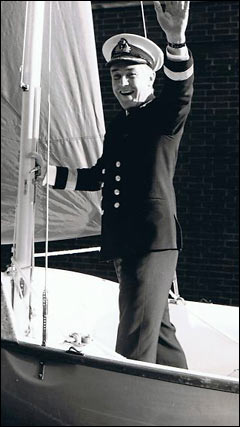![]()

Vice-Admiral Sir George Vallings, who has died aged 75, was prevented by illness from rising still further in the Navy; he devoted much of his life to a variety of interests connected with the sea and the underprivileged.
George Montague Francis Vallings, the son of a whisky salesman, was born in Nairobi, Kenya, on May 31 1932 but was brought up mainly in Scotland, where his grandfather was rector of St John's, Perth.
He enjoyed sailing holidays on Mull, and was
educated at Bellhaven Hill, Dunbar, before entering Dartmouth, which was still
at its wartime location, Eaton Hall.
In his youth Vallings lost several of his teeth boxing and playing rugby, and
years later his dentures fell into the grave when he was saluting at a service
funeral.
Vallings rose quickly in the service but saw little action. He served as a
midshipman in the carrier Theseus during the Korean War and became flag
lieutenant to Rear-Admiral Deric Holland-Martin during the Suez operation, which
led to his earning the first promotion of his term to commander.
During the 1960s he commanded the anti-submarine frigate Scarborough and the
Daring-class destroyer Defender before standing by the guided-missile destroyer
Bristol, building at Swan Hunter's yard between 1970 and 1973. After two years
as British naval adviser in Canberra, Vallings became captain, Second Frigate
Squadron, in the frigate Apollo.
From 1978 to 1980 he was director of operations and trade at the Ministry of Defence before becoming Commodore, Clyde, where he dealt with industrial unrest caused by the start of privatisation of the dockyards by deploying his charm and Scottish credentials.
He faced the same problem as Flag Officer, Gibraltar, and Flag Officer, Scotland and Northern Ireland, when he oversaw the privatisation of Gibraltar and Rosyth dockyards. He was appointed KCB in 1986 and retired the next year, after being diagnosed with cancer.
Over the next decade Vallings was secretary of the Chartered Institute of Management Accountants. But he will be best remembered for his contribution to sailing.
In 1960 he won two prime Cowes Week trophies, the New York Yacht Club Cup and the Britannia Cup, in a brand new but standard services sail training yacht.
In 1973 he skippered the Nicholson-55 Adventure on the most challenging leg of the first Whitbread round-the-world race, from Sydney to Rio de Janeiro.
Vallings took a southerly route round the Antarctic ice edge, which no one has followed since. Off Cape Horn his rendezvous with the ice patrol ship Endurance was spoiled when the wadding from the nine-gun salute that she fired tore through Adventure's best genoa. Nevertheless, he crossed the line first by 10 minutes.
Vallings raced at Cowes in the British Admiral's Cup Team in Noryema and Quiver, and took line honours in the Fastnet, Le Havre and St Malo races.
He was also in the winning boat on handicap in the 1976 Sydney-Hobart race.
Later Vallings was chairman of the Royal National Mission to Deep Sea Fishermen; chairman of the race committee for the Tall Ships Race; and president of the International Association of Cape Horners.
He campaigned for the preservation of the destroyer Cavalier at Chatham, and found new headquarters for the Gibraltar Sea Scouts.
For more than 40 years Vallings was involved with Bede House, a charity for the disadvantaged in Rotherhithe. He started as a volunteer, running a boxing club under Southwark railway arches. As a trustee, he attended its youth adventure camp on the Welsh border, where, despite advancing years, he played football. Later he founded the Long Ditton youth club, undertaking every role from caretaker to youth worker and accountant.
An avid follower of National Hunt racing, he never gambled more than £1 on a race and once returned £1 to a bookie who had overpaid him.
He described his captaincy of the "Dads' Army" team at Woking golf club as his greatest achievement.
George Vallings married, in 1964, Tessa Cousins; they had three sons.